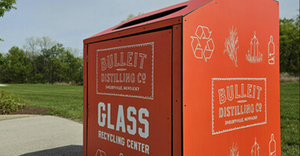Trump Administration Launches Food Waste Reduction Initiative
The agreement attempts to better educate Americans on the impacts and importance of reducing food loss and waste.
The U.S. Department of Agriculture (USDA), the U.S. Environmental Protection Agency (EPA) and the U.S. Food and Drug Administration (FDA) announced the signing of a joint agency formal agreement under the “Winning on Reducing Food Waste” initiative.
The agreement is aimed at improving coordination and communication across federal agencies attempting to better educate Americans on the impacts and importance of reducing food loss and waste. Signing the joint agency agreement were U.S. Secretary of Agriculture Sonny Perdue, Acting EPA Administrator Andrew Wheeler and FDA Commissioner Scott Gottlieb.
In the United States, food waste is estimated at between 30 to 40 percent of the food supply. This figure, based on estimates from USDA's Economic Research Service of 31 percent food loss at the retail and consumer levels, corresponded to approximately 133 billion pounds and $161 billion worth of food in 2010. Wasted food is the single largest category of material placed in municipal landfills and represents nourishment that could have helped feed families in need. Additionally, water, energy and labor used to produce wasted food could have been employed for other purposes. Effectively reducing food waste will require cooperation among federal, state, tribal and local governments, faith-based institutions, environmental organizations, communities and the entire supply chain.
While there have been significant actions taken and commitments made through public-private partnerships to date, such as the U.S. Food Loss and Waste 2030 Champions initiative, which aims to reduce food waste by 50 percent by 2030, there is still much work to be done. The Trump Administration commends the 23 organizations and businesses that have joined the U.S. Food Loss and Waste 2030 Champions, including the two most recent companies—Kroger and Hilton. And while businesses are a critical component of food waste reductions, consumer education is also key to the Winning on Reducing Food Waste Initiative.
"An unacceptable percentage of our food supply is lost or wasted," said Perdue in a statement. "As the world's population continues to grow and the food systems continue to evolve, now is the time for action to educate consumers and businesses alike on the need for food waste reduction. I am pleased to be joined by my Trump Administration colleagues on this important, common sense issue. The future of food depends on action from us now, which is why we have established this formal partnership among USDA, EPA and FDA."
"EPA is proud to partner with USDA and FDA to enhance food recovery efforts and educate the public on the need for improved food waste management," said Wheeler in a statement. "Redirecting excess food to people, animals or energy production has tremendous economic and social benefits, and that is why the Trump Administration is working closely with businesses and consumers to prevent food loss and maximize the inherent value of food."
"Sadly, each day too many American families struggle to meet their nutritional needs, and we at the FDA recognize the important role that reducing food waste can play in filling this critical gap," added Gottlieb. "By taking steps to address obstacles that food donation and recovery programs may face in giving unsold foods a second opportunity and helping food producers find ways to recondition their products so that they can be safely sold or donated, our aim is to both reduce food waste and nourish Americans in need. We are delighted to be collaborating with our federal partners on the Winning on Reducing Food Waste initiative as we continue to explore additional ways to reduce food waste and make safe, nutritional foods available to all."
The agencies stated they collectively look forward to hearing feedback from stakeholders about how they can work together at the federal level and leverage partners throughout the supply chain to have national impact on reducing food loss and waste in the long term.
The agencies offer some additional information on how to become a U.S Food Loss and Waste 2030 Champion.
About the Author(s)
You May Also Like


